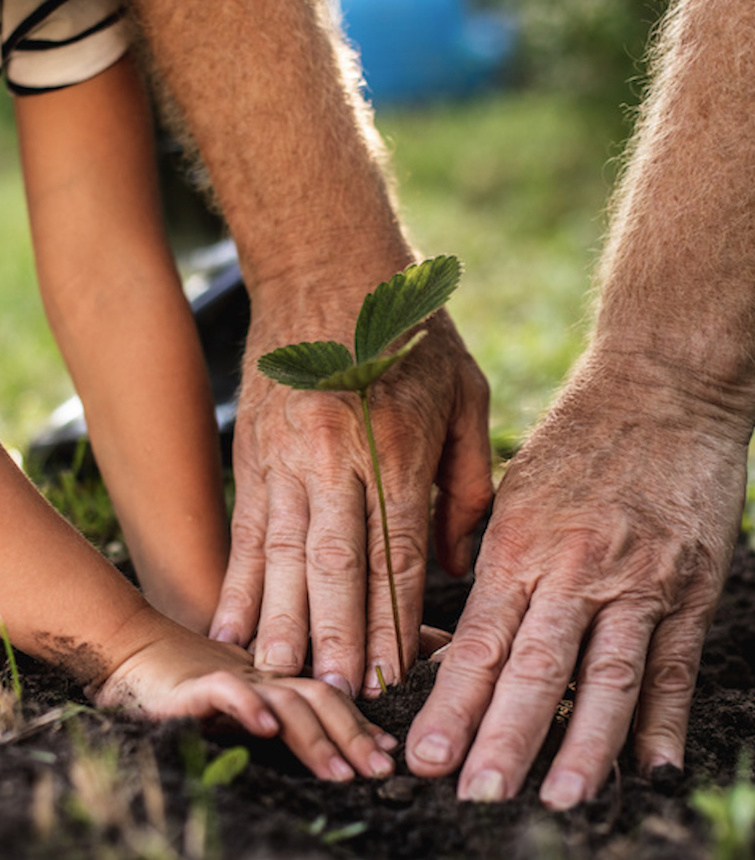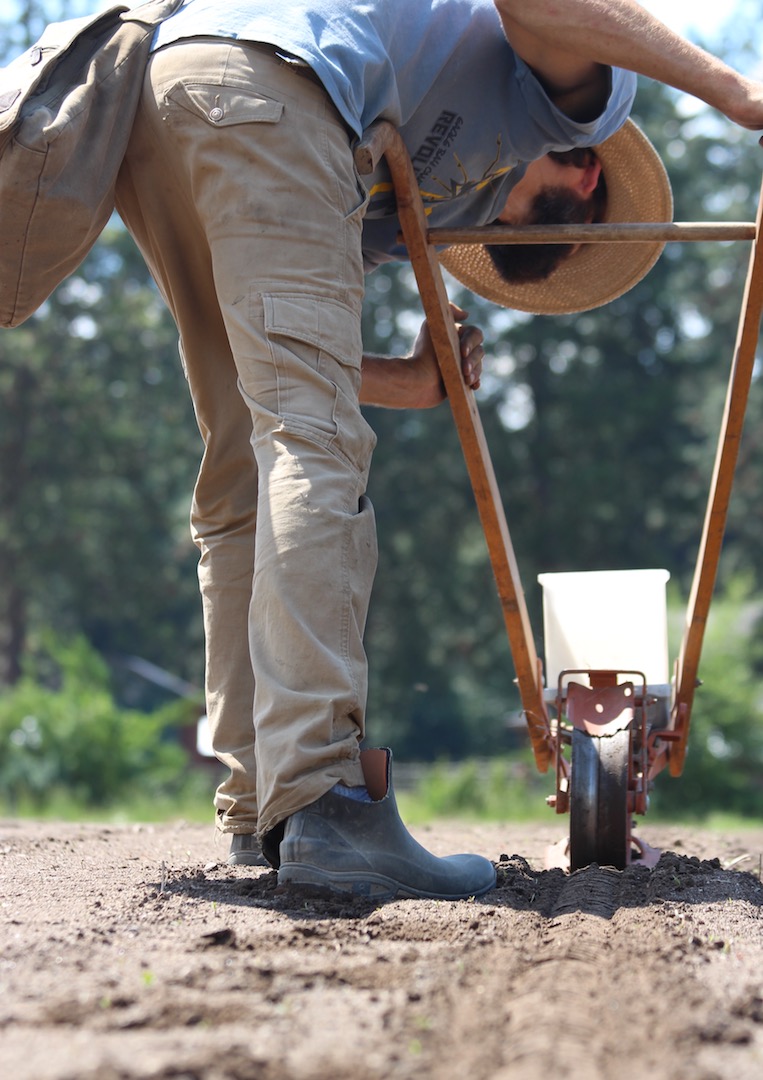What is food security, food justice and food sovereignty?
Food security, food justice and food sovereignty movements work to address food insecurity and the structural inequities within society at the root of these problems. Many principles within these movements overlap with organic principles.
- Food security is the right of all people, at all times, to have access to healthy and nutritious food.
- Food justice ensures the right of all people to have access to healthy, nutritious and culturally appropriate food by addressing underlying structural inequities within the food system which create insecurity and injustice.
- Food sovereignty is a people’s right to healthy, nutritious and culturally appropriate food, as well as the right to define their own food and agricultural systems.


Why are these movements necessary?
Our current food and agricultural systems are inequitable for many as a result of existing power dynamics. The organic movement aims to create a healthy world for all through sustainable, fair and just practices. In moving towards these goals it is crucial that inequities within society are recognized and addressed, such as:
- Rights of Indigenous peoples. Agriculture in Canada has a history of violating Indigenous food sovereignty and other rights of Indigenous peoples, including forced removal and relocation to make way for the farms of European settlers.
- Racism and discrimination towards Black, Indigenous and people of colour. Black, Indigenous and people of colour in Canada are disproportionately affected by food insecurity and negative health impacts as a result of systemic racism and colonialism. Black, Indigenous and people of colour working in the agriculture sector also face greater barriers in owning land and accessing stable employment.
- Gender discrimination. Women in agriculture continue to face more barriers than men, such as earning less income and lack of representation.
- Rights of migrant agricultural workers. Migrant agricultural workers in Canada face unfair living and working conditions as a result of racialization, geographic isolation, restricted access to social services and legal issues.
- Disability discrimination. Canadians with disabilities live at poverty rates 40% higher than Canadians without disabilities. Farmers and agricultural workers with disabilities face barriers such as difficulty accessing services and finding work.
Social justice in organics
Opinion: Fairness in Organic Agriculture (Anne Macey)
Reviving Social Justice in Sustainable & Organic Agriculture (Elizabeth Henderson)
Food security and food justice organizations
Canada-Wide
Food Secure Canada: Food Justice Network
Food Secure Canada is a pan-Canadian alliance of organizations and individuals working together to advance food security and food sovereignty.
Slow Food is a global, grassroots organization, founded to prevent the disappearance of local food cultures and traditions, counteract the rise of fast life and combat people’s dwindling interest in the food they eat, where it comes from and how our food choices affect the world around us.
Canadian Agri-Food Sustainability Initiative (CASI)
Initiative enabling clarity and transparency in terms of capturing and communicating best management practices to improve economic, environmental and social outcomes across the Canadian agri-food system.
A Rocha: Sustainable Agriculture
Christian organization engaging in scientific research, environmental education, and community-based sustainable agriculture programs.
International
La Via Campesina: International Peasant’s Movement
International movement which coordinates organizations of small and middle-scale producers, agricultural workers, rural women and indigenous communities. La Vie Campesina advocates for family-farm-based sustainable agriculture, food sovereignty, farmer’s right to seeds, stopping violence against women and agrarian reform.
Food First (Institute for Food & Development Policy)
Food First envisions a world in which all people have access to healthy, ecologically produced, and culturally appropriate food.
Supporting a global movement of farmers fighting for justice, health and sustainability.
Multi-donor fund supporting viable food systems, promoting the economic well-being and human rights of small farmers and their communities, and mitigating climate change through low input agriculture featuring sustainable soil and water use. It links organizations and movements that advance agro-ecological solutions locally, regionally and globally.
Racism within food systems
We Cannot Talk about Food without Talking About Racism (Leticia Ama Deawuo, SeedChange)
Farming in Canada: Who else do you have to thank? Young Agrarians article
Structural Racism in our Food Systems
Webinar hosted by the Inter-institutional Network for Food, Agriculture & Sustainability (INFAS), featuring Black women scholars examining the intersections of inequities in food, food systems and sustainable agriculture.
Food—Systems—Racism: From Mistreatment to Transformation (Eric Holt-Giménez and Breeze Harper)
Series of articles on racism and liberation in the food system (Food First).
Black Food Insecurity in Canada
Article from Melana Robert, a Toronto-based municipal and federal food policy advisor, public speaker and community advocate.
Canadian government initiative helping under-represented groups in Canadian agriculture to fully participate in the sector.
Women in agriculture
FCC (Farm Credit Canada) Women Entrepreneur Program
The FCC is committed to empowering women in agriculture, agribusiness and food by providing increased access to capital, tools, resources and education to help start and grow businesses.
Migrant agricultural workers
List of organizations in Canada providing support to migrant agricultural workers.
Fuerza Migrante (Migrant Force)
Community organization in BC for the freedom and autonomy of migrants in the fields, based on mutual aid and community defense.
Farmers with disabilities
The Canadian Farmers with Disabilities Registry (CFWDR)
Canadian organization with the mandate to encourage and support farmers living with disabilities or illness.
Funding project focused on supporting the cost of adaptive technology for farmers that have experienced a traumatic injury.
Indigenous food sovereignty
Food Sovereignty: Indigenous Food, Land & Heritage
Article from Young Agrarians, written by Dawn Morrison.
UBC Farm: Indigenous Initiatives
The Centre for Sustainable Food Systems (CSFS) at UBC Farm operates four community-based Indigenous Initiatives examining the intersection of land, food and community and promoting research that benefits First Nations, Métis, and Inuit People.
First Nations Food, Nutrition & Environment Study
A national scope study on the benefits and risks of food and water in First Nation communities.
Indigenous Food Systems Network
Network created by the Working Group on Indigenous Food Sovereignty to allow individuals and groups involved with Indigenous food related action, research and policy reform to network and share relevant resources and information.
Indigenous Food Security Project
Project created by the Centre for Indigenous Environmental Resources (CIER) as part of their vision of sustainable First Nations communities and a healthy environment.
Indigenous Environmental Network
A grassroots network of Indigenous leaders and communities across Turtle Island fighting for Environmental Justice and the Rights of Mother Earth.
Initiatives helping to reduce childhood hunger within Indigenous communities by increasing access to good food and traditional food practices, and by encouraging healthy eating.

